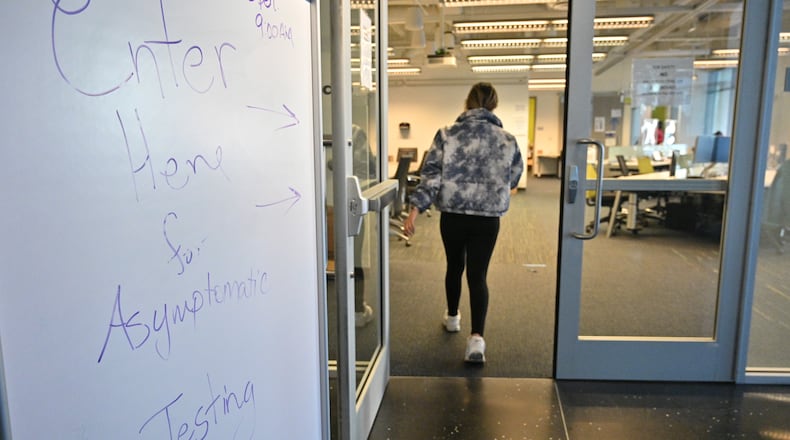The number of Georgians being admitted to the hospital with COVID-19 has fallen to the lowest point since the earliest days of the pandemic. And so far, the sharp rise of BA.2, a subvariant of omicron, is not leading to an uptick in severe cases, according to a state health official who provided an update on the pandemic at a Georgia Department of Public Health board meeting Tuesday.
“Looks like good news and indeed is good news particularly relative to other waves in this pandemic,” said Georgia Department of Public Health epidemiologist Cherie Drenzek during her presentation. “But as you’ve heard me say many times before, we can not be complacent, this virus is still with us. It will not be eliminated. It has proven very adept at changing.”
The BA.2 subvariant is extremely similar to the original omicron variant. Omicron was already more contagious than earlier strains of the virus, but a number of studies indicate BA.2 spreads even more easily from person to person. However, it does not appear to cause more severe disease.
It is quickly gaining traction and is now the dominant version of the coronavirus. Drenzek said at the board meeting the BA.2 subvariant now makes up about 60% of new COVID infections in Georgia.
Drenzek noted several states, particularly in the Northeast, are reporting an increase in cases. But cases and hospitalizations in Georgia continue to decline.
While acknowledging a lot of uncertainty surrounds COVID, Drenzek said it’s possible, perhaps even likely, that a rise in BA.2 in Georgia will not lead to another massive surge of cases and hospitalizations. Vaccinations and immunity conferred by an earlier infection should cushion the impact. Even so, public health experts say Georgia remains vulnerable, especially because of the relatively low rates of vaccination and boosters. Just over half — 56% — of the population in Georgia is fully vaccinated, and 23% of the population is boosted.
Vaccines continue to be extremely effective in protecting people from severe disease, especially for those who have been boosted. The antiviral drugs Paxlovid and molnupiravir also appear to be effective against both omicron variants, as long as they are taken soon after a positive test and within five days of first symptoms.
Credit: Steve Schaefer
Credit: Steve Schaefer
Early data also suggests people who caught the original omicron variant will have some degree of immunity against this sub-variant. Even so, doctors continue to encourage people who had COVID in the past to get vaccinated for longer, stronger immunity.
In discussing the latest encouraging trend line with COVID cases and hospitalizations, Drenzek pointed to the dramatic decline of hospitalizations – which stood at 419 statewide Tuesday, down 93% from the latest peak in January during the omicron-fueled surge.
It’s harder to measure the exact spread of the virus with more people using at-home tests which are not reported to state health departments. The 7-day daily average of COVID cases, based on rapid and PCR tests performed at labs, stood at 536 cases Wednesday.
“I wish I could say with certainty exactly what’s going to happen with BA.2 but I don’t know just like everything else with the pandemic,” said Drenzek.
About the Author







